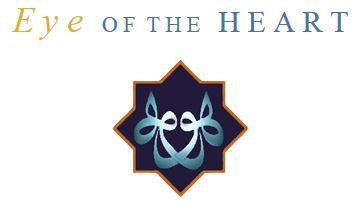
THRESHOLD SOCIETY NEWSLETTER ~ MAY 2017
Sufism & Our Hearts
“We are developable beings. Let’s not neglect the role that the heart plays in developing every aspect of the human being… We need to strengthen our hearts. It is the love of God, and a trust in the purposefulness of existence that leads to strengthening the heart. We have an innate capacity to experience the Infinite, and I don’t mean some merely mental abstraction, but something expansive and regenerative. We have a right to this experience, we have a need for it… for our own health and well-being we have a need for an experience of the Divine.” ~ Shaikh Kabir
A recent interview by Benedict Just who is working on a documentary about The Heart.
***
Reflection on April’s theme: O my God! I ask for faith that will
bring enthusiasm to my heart…
~ Mevlevi Wird
~ Jeremy Henzell-Thomas (Colchester, UK)
 Enthusiasm naturally sounds to us like a positive virtue. ‘Enthusiasm is the vehicle of my life’, said Hazrat Ali, and for Ralph Waldo Emerson, 19th century American essayist and leader of the transcendentalist movement, it is ‘the mother of effort, and without it nothing great was ever achieved.’ George Sand, the 19th century French novelist, equally well known for her romantic involvement with Polish composer, Frederic Chopin, makes some stirring and eloquent connections between faith, enthusiasm, and the expansiveness and grandeur of a vision that transcends mere intellectualization. ‘Faith, she writes, ‘is an excitement and an enthusiasm: it is a condition of intellectual magnificence to which we must cling as to a treasure, and not squander on our way through life in the small coin of empty words, or in exact and priggish argument.’ We might discern in Sand’s telling distinction between ‘intellectual magnificence’ and argumentative pedantry an echo of Mevlana’s dictum that ‘the intellect is the husk; the Intellect of the intellect [the Mind-Heart, or Nous] is the kernel’. We might also recall his repeated warnings to avoid the ‘knots’ of ‘excessive’ and ‘complicated thinking’ and our addiction to ‘subtle discussions’, because ‘the explanation is in higher worlds’. And the power of enthusiasm to make an upward leap and connect us with the beauty and majesty of that transcendent reality is only too clear from the derivation of the word itself. It comes from Greek en-theos, to be ‘filled by God’ or ‘divinely inspired’.
Enthusiasm naturally sounds to us like a positive virtue. ‘Enthusiasm is the vehicle of my life’, said Hazrat Ali, and for Ralph Waldo Emerson, 19th century American essayist and leader of the transcendentalist movement, it is ‘the mother of effort, and without it nothing great was ever achieved.’ George Sand, the 19th century French novelist, equally well known for her romantic involvement with Polish composer, Frederic Chopin, makes some stirring and eloquent connections between faith, enthusiasm, and the expansiveness and grandeur of a vision that transcends mere intellectualization. ‘Faith, she writes, ‘is an excitement and an enthusiasm: it is a condition of intellectual magnificence to which we must cling as to a treasure, and not squander on our way through life in the small coin of empty words, or in exact and priggish argument.’ We might discern in Sand’s telling distinction between ‘intellectual magnificence’ and argumentative pedantry an echo of Mevlana’s dictum that ‘the intellect is the husk; the Intellect of the intellect [the Mind-Heart, or Nous] is the kernel’. We might also recall his repeated warnings to avoid the ‘knots’ of ‘excessive’ and ‘complicated thinking’ and our addiction to ‘subtle discussions’, because ‘the explanation is in higher worlds’. And the power of enthusiasm to make an upward leap and connect us with the beauty and majesty of that transcendent reality is only too clear from the derivation of the word itself. It comes from Greek en-theos, to be ‘filled by God’ or ‘divinely inspired’.
Given all these positive views of enthusiasm, we might well ask why the word also carries a certain degree of ambivalence. Historically, its association with religious fervour has periodically evoked the sense of fanaticism. If Socrates taught that poetic inspiration was a form of ‘enthusiasm’, the term was also used by the Greeks to refer to divine possession by the God Dionysus as in the ecstatic frenzy of the Maenads (‘the raving ones’) whose rites climaxed in maniacal dancing and frenzied feats of strength and madness, such as uprooting trees, and tearing a bull (the symbol of Dionysus) apart with their bare hands.
I remember when I took up the post of Director of Studies at a school in England many years ago, an attitude had developed amongst the students in their early teens that it wasn’t ‘cool’ to be enthusiastic about anything. Although I guessed that this was perhaps a teenage ‘phase’ or fashionable posture, I set myself the goal of changing it, and I was glad when the phrase ‘it’s cool to be keen’ became the motto of the great majority of my pupils and the driver of a vibrant culture of self-development within the school.
Other kinds of cultural conditioning can also be barriers to the realization of the essence of a virtue such as enthusiasm. To some extent, suspicion of enthusiasm is etched into the self-image of the British. It had become a pejorative term denoting fanaticism during the years immediately following the ‘Glorious Revolution’ of 1688 in England, when it came to refer to advocacy of any political or religious cause in public. Such ‘enthusiasm’ was seen as the cause of the atrocities perpetrated in the English Civil War. The Royal Society even had bylaws stipulating that any person discussing religion or politics at a Society meeting was to be summarily ejected for being an ‘enthusiast.’ Methodists such as John Wesley were accused of blind enthusiasm, a charge against which they defended themselves by distinguishing fanaticism from the ‘religion of the heart’. In this climate of rejection of enthusiasm, the Church of England evolved its own brand of ‘moderation’. In a recent article in The Times (14 April), Michael Gove, the former Minister of Education in the UK, praises Anglicanism, which, though ‘mocked by some as insipid’, has a ‘gentleness and grace, a habit of listening and an ethic of understanding which makes enthusiasm almost anathema.’
Several years ago I gave a lecture at the British Academy about ‘Britishness’ in relation to Islamic values, and started by questioning the assertion of Andrew Marr that the British are hostile to ‘taking anything, even the meaning of life, too seriously… If God is still with the British’, he had said (though half-jokingly), ‘He will be quiet, understated, embarrassed by enthusiasm…’. The philosopher Roger Scruton agrees in identifying ‘silence’ as the ‘normal condition of the English in both public and private’, as well as the self-restraint that ‘deplores the volatile humours of Mediterranean people!’ It is this reserve that also underlies the perception of many British people that Americans are more ‘upbeat’ than they are.
One of the most useful keys to navigating through various connotations of a word such as ‘enthusiasm’ is the principle of the Golden Mean which permeates Al-Ghazali’s approach to Islamic ethics. The Prophet Muhammad himself is reported to have said ‘Verily, everything has an enthusiasm and every enthusiasm has a limit.’ Just as the virtue of courage is the mean between its deficiency as cowardice and its excess as recklessness, so enthusiasm can be regarded as the virtue that lies between the vices of half-heartedness or indifference and unbridled fanaticism or zealotry. In the same way, the virtue of modesty (which the Prophet regarded as the ‘distinctive virtue’ of Islam) might be regarded as lying between the total self-deprecation that is a denial of ‘personal sovereignty’ and the self-inflation that denies ‘divine sovereignty’.
The important point to realize is that virtues like courage, enthusiasm and modesty are not diluted or insipid compromises between two extremes, any more than ‘moderation’ or the ‘middle way’ should be seen as a ‘middling’, ‘average’ or ‘mediocre’ state.
As Mevlana says:
Gamble everything for love,
If you’re a true human being.
If not, leave this gathering.
Half-heartedness doesn’t reach
into majesty. You set out
to find God, but then you keep
stopping for long periods
at meanspirited roadhouses.
Enthusiasm is nothing less than the full engagement of our whole self and entire attention in the turning of our face towards the object of our love. It can never be synonymous with fanaticism because the fanatic, in his frenzy, is in a state of rupture from the totality and unity of human faculties that constitute the whole self in a state of healthy balance.
May we be filled with that quality of enthusiasm that brings us face to face with the Friend.
~ Jeremy Henzell-Thomas is an independent researcher, writer, educational consultant, and visiting fellow at the University of Cambridge.
***
April Theme
Make extraordinary and bold efforts on the Path, but remember who the Doer is.
~Abul Hasan Kharaqani
We welcome your reflections on this theme.
***
Annual British Columbia Retreat: Living in the Truth
July 6-9
Kabir Helminski with Sufi music by Ali Razmi

Living in the Truth, implies honesty and sincerity with ourselves,
a reliance on our own experience even when guided by the beauties of a tradition.
The Mevlevi Path of Sufism is not about adding to our beliefs,
but opening to spiritual perception, living the Truth.
A Threshold Retreat is a time to recharge, elevate our vibration,
deepen our perspective on life, and be inspired by each other.
Join us for Summer (inshallah) in British Columbia: a weekend of friendship,
Sufi music, zhikr, and contemplation in the tradition of Rumi.
More details and registration.
***
Ya Badi, Ya Qawi, Ya Rahman
~ offered by Shaikha Camille Adams Helminski
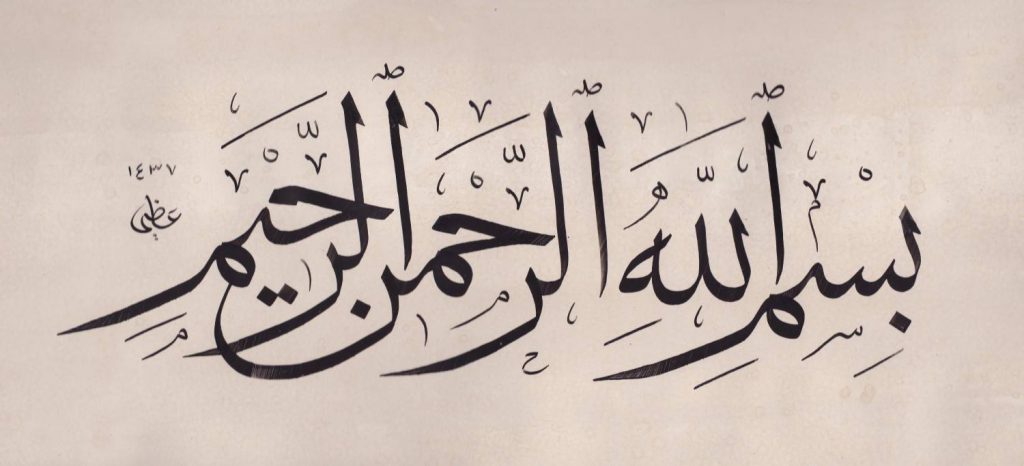
© Azim Rehmatdin
You spoke
and we became.
Will You help us tame
these desires
You implanted in us?
You know our limitations
and our skill;
everything originates with You.
So show us the purpose of these faults we find
that break our concentration in Your Love.
So much to learn,
we find our way only with Your help,
You who imagine all the intricacies
of Compassion
that might fill our hearts.
Seeing someone struggle
reminds us of our own.
We are nothing
without Your Brilliance
that shines through
all the cracks
in our armor;
amour is essential,
not these defenses
we employ
to shield ourselves
from Your expansion and contraction—
even sheets of ice
dissolve
when Your spring arrives,
and cherry blossoms
burst in the orchard,
and we are overwhelmed
with the flood of Your Beauty,
Ya Badi,
Ya Wahhab,
Ya Wadud.
Ya Badi, O Skilful Creator, Originator,
Ya Qawi, The Source of All Power,
Ya Rahman, O Infinitely Compassionate One
Ya Wahhab, O You Who Overcome Us with Your Infinite Giving,
Ya Wadud, O Infinitely Loving One
The Originator is He/She of the heavens and the earth:
and when He/She wills a thing to be, He/She but says unto it, “Be” – and it is. . .
Indeed, We have made all the signs manifest unto people who are endowed with inner certainty.
[2:117-118]
Limitless is He/She in His/Her glory,
and sublimely exalted above anything that people may devise by way of definition:
the Originator of the heavens and the earth!
[6:101]
Say: “Travel through the earth
and see how God originated creation.
Even so will God create again,
for God has power over all things.”
[29:20]
O children of Adam! Indeed, We have bestowed upon you from on high
garments to cover your nakedness, and as a thing of beauty:
but the garment of God-consciousness is the best of all.
Herein lies a message from God, so that people might take it to heart.
[7:26]
Read more Moments with the Names
***

Documentary Premiere of “Humanity Rising in the Refugee Crisis”
Tuesday 23rd May, 6-9pm, Courthouse Doubletree Hotel, London
“Humanity Rising in the Refugee Crisis” is a 60 minute documentary film, featuring Shaikh Kabir, focusing on how humanity is awakening and responding in the crisis of our time.
Set to premiere in London the film details a journey to the heart of what makes us human, touchingly explored through the personal stories of refugees, volunteers, ordinary people, academics and spiritual leaders, capturing how the largest humanitarian crisis since WWII is affecting us all. Join us for the premiere and book your tickets now to support this initiative.
Shaikh Kabir’s full interview will be released in June but you can have a sneak peak at some of his views on the crisis of our time.
***
Holistic Islam. Sufism, Transformation, and The Challenge of Our Time
Kabir Helminski
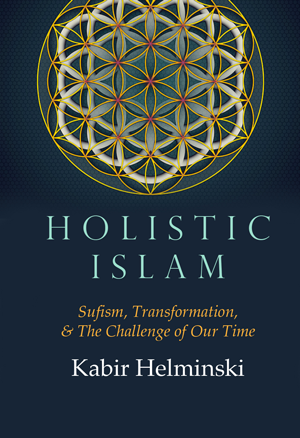
Publishing June 1st, available for pre-order through Amazon, etc.
Sufism has long been the kernel of Islamic truth and the embodiment of its wisdom. Kabir Helminski’s Holistic Islam is a sagacious and indeed perspicacious walk through the heart and soul of Islam. It is an essential source for anyone who is interested in Sufism or in the moral impulse that motivated great sages like Rumi and Hafiz. Perhaps, more importantly, I think this book is a must read for anyone who wants to understand the real Islamic faith.
~ Dr. Khalid Abou El Fadl, Distinguished Professor of Islamic Law at the UCLA Law School, UCLA. and author of The Great Theft: Wrestling Islam from the Extremists
***
Principles of Spiritual Practice
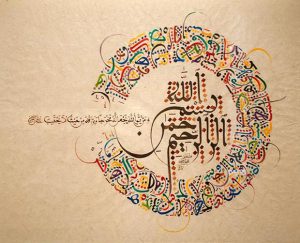
Recent podcasts from Louisville
***
Preparing for Ramadan
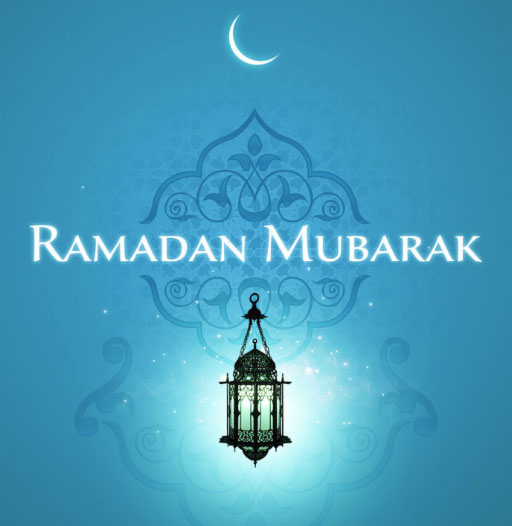
Ramadan has so many dimensions: purification, sacrifice, community, the still and subtle emptiness of the heart. It reorients us in so many ways. Ramadan is less something that we do—instead it is a force field we enter and are transformed by. But it does take intention and effort on our part. If we can, we participate in the fast. Perhaps we also find other intentions, new aspects of awareness that become part of this sacred time. I’d like to share something I’ve learned.
There are some things we habitually give our attention to that drain us, or reduce our spiritual attunement, things that we take for granted as aspects of modern life: the media, entertainment, the internet. If we pay careful attention to the state that is created as a result of our communing with these sources and how much time we give to them, we might learn something important.
Conversely, if we pay attention to the state we experience when we turn toward trusted spiritual sources, we may begin to discern a significant difference. Some things drain us and some things replenish us.
Ramadan is a time to notice what we give our attention to, what energizes us, in contrast to what drains us of joy, love, peace, hope.
The Invisible Rain of Ramadan
Ramadan comes glowing
after night’s long hours.
Ramadan comes to earth
thirsting for fresh rain.
Ramadan comes like a friend
embracing with strong arms.
Ramadan opens the door
of our invisible home.
~ Kabir Helminski
***

Threshold’s collaborative blog channel The Living Tradition on Patheos.com is reaching new audiences and sharing the experiences of our community in a unique and vibrant way.
Let us know what you think by commenting on the posts — join the discussion at
www.patheos.com/blogs/livingtradition and “follow” The Living Tradition.
Recent articles:
What the Heart Knows by Daniel Thomas Dyer
On Saints as Friends of the Divine by Anna Rohleder
Complex Trauma and Spiritual Healing Power of Sufism by Daliah Merzaban
***
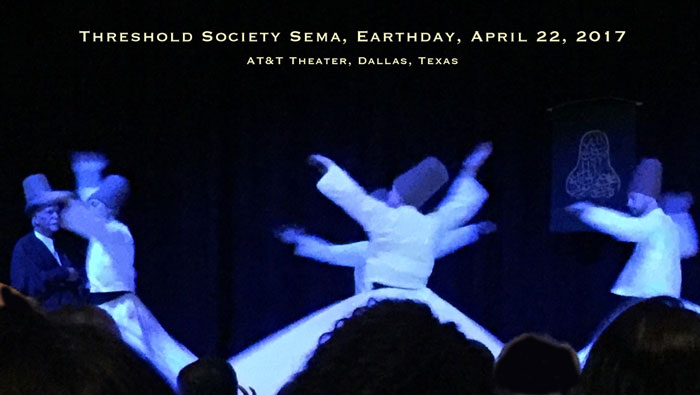
Threshold Society was invited by Islamicartrevival.com to offer a traditional Sema
for Earthday in Dallas, Texas. Musicians included: Ali Razmi, Celil Refik Kaya, and Selcuk Gurez.
Semazens: Farzad Attar Jafari, Chris Tate, Lindsey Ridgway, and Mira Hunter.
Watch a video clip from the evening.
***
Calendar
May 5-9: Paradise Island, Bahamas. Meditation Symposium at the Sivananda Ashram. sivananda.org (K)
INDONESIA
May 18: Evening meeting with Jakarta Threshold Circle. For information, Ita S Mucharam: ita7777@gmail.com (K)
May 21: Speaking about “Re-contextualizing Islam” at the annual Bahtsul Masa’il, of the Nahdlatul Ulema, Jombong, East Java (K)
May 24: Informal poetry reading at Living Light, Ubud, Bali, contact eyeoftheheart@sufism.org (K)
May 25-Jun 24: Ramadan
Jul 7-9: Whistler, Canada. Annual Retreat British Columbia, more details and registration. (K)
Sep 1-4: Annual UK retreat at Gaunts House, Dorset. Registration details in July. (KC)
Oct 19-23: San Jose, US. Science & Non-Duality Conference (K)
Events with Sh. Kabir and Sh. Camille marked (KC)
***
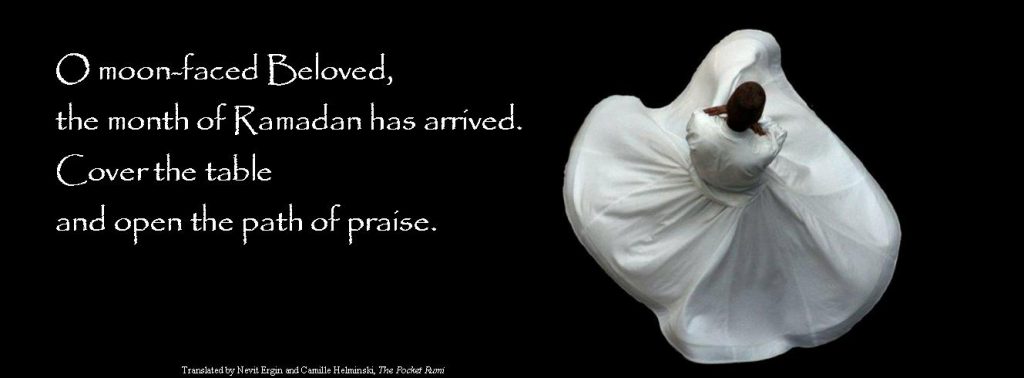
***
The Ladder of Love
~ Camille A. Helminski 2017
Excerpt from Sketches from the Unseen

Moving
up and down
the ladder of love—
You raise us up
and bring us down
that we might experience
the Light fantastic
realms
and stretch beyond
the bounds
of self restricted
sustenance.
You would have us know
the infinite variety
of all Your tastes
and textures.
How could we face
each other
unless You turn our hearts
to hear the magnetism calling
from another soul
You have created,
also, to know
these realms of dancing
and singing from the roof,
the minaret,
the tower,
the garden wall,
and within the enclosure
of Your beauties,
where fragrant roses
hyacinth and lilies
intimate Your Presence?
O dearest Beloved,
we laud Your stunning Creativity
that sparkles on land and sea,
and yet,
Your nearness is what we crave—
to go beyond the surfaces
to know You in our depths,
the remembrance,
the mentioning,
the cognizance
of God is the greatest—
She/He/It—
the Breath of the breeze
that everywhere causes
Subsistence,
the lying down
and the rising up
of palpable Being
within our hearts.
***
We’d love to hear from you – get in touch at eyeoftheheart@sufism.org
***
Find out how to support the work of Threshold Society
***

